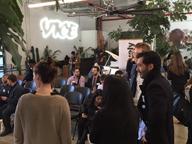Faculty News
—
Professor Arun Sundararajan comments on the future of the sharing economy
—

Excerpt from CBC Radio -- "'If we look forward ten years, a healthy double digit percentage of many large economies will be sharing economy activity' he says. He sees a particularly strong role for countries like China, where the emerging middle class '...think about getting a car on demand rather than owning a car, or staying in Airbnb-style accommodation rather than going to a hotel. So the entire model of consumption that they embrace as they become middle class consumers may end up being sharing economy aligned.'"
Faculty News
—

Excerpt from CBC Radio -- "'If we look forward ten years, a healthy double digit percentage of many large economies will be sharing economy activity' he says. He sees a particularly strong role for countries like China, where the emerging middle class '...think about getting a car on demand rather than owning a car, or staying in Airbnb-style accommodation rather than going to a hotel. So the entire model of consumption that they embrace as they become middle class consumers may end up being sharing economy aligned.'"























